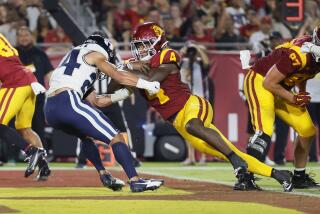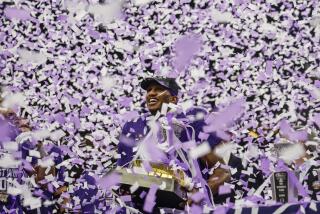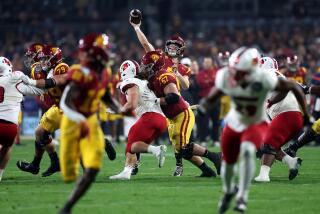A Bittersweet Twist
The pillars fell, one by one, as if they were in diabolical collusion.
Syracuse toppled Notre Dame.
USC tipped over Oregon State.
Louisiana State knocked over Georgia.
Kansas State bounced Oklahoma.
Then, in a game that started Saturday evening on a Pacific island and ended Sunday morning at 3:17 EST, Boise State knocked over the whole pineapple cart with a win over Hawaii.
It was about then that the bowl championship series went Ka-boom.
The BCS, created in 1998 to help stabilize the fractious nature of naming college football champions, came apart like a cheap watch.
Chaos, confusion and ridicule won the day Sunday as the BCS’ nightmare had to be formally revealed.
USC, fresh off a 52-28 drubbing of Oregon State, moved to No. 1 in both the writers’ and coaches’ polls, yet the Trojans finished No. 3 in the final BCS standings, the complicated mechanism used to determine the title-game participants.
Because of bizarre and unforeseen circumstances, the nation’s No. 1 team will not play for the BCS national title in the Jan. 4 Sugar Bowl, which will host Oklahoma vs. Louisiana State.
USC will play No. 4 Michigan in the Rose Bowl.
“Obviously, there’s some kind of a problem, because the No. 1 team in the country is not playing in that game,” USC Coach Pete Carroll said Sunday on ABC’s bowl selection show.
As expected, Oklahoma’s first loss Saturday night was not enough to drop the Sooners from the No. 1 BCS position.
Oklahoma finished first in the BCS with 5.11 points, followed by LSU at 5.99.
USC ended up third with 6.15 points, only .16 behind LSU.
Victories by Syracuse, LSU and, yes, Boise State allowed LSU to make up 1.53 points on USC and nip the Trojans for the No. 2 BCS spot.
That, and the fact LSU, which trailed USC in four of the seven BCS computers last week, ended up ahead of the Trojans in six computers.
How close was it?
Had Washington State not blown a fourth-quarter lead against Washington last month, USC would be going to the Sugar Bowl instead of LSU.
That loss dropped Washington State out of the BCS top 10 and cost USC the “quality win” points it had been receiving for beating the Cougars.
Pacific 10 Conference Commissioner Tom Hansen said Sunday it was a “great shame” that USC was not in the Sugar Bowl and vowed to push for reforms in the BCS system.
With USC getting edged out by only 0.16, Hansen asked the BCS to review the final results to make sure there was not a miscalculation.
“Who knows if someone hit a wrong key stroke?” Hansen said.
He was assured, however, that the numbers were correct despite the fact six of the seven computers do not make their formulas public.
For the third time in the BCS’ six-year history, the No. 1 and No. 2 teams in the polls will not meet on the field.
What’s more, the voting coaches in the USA Today/ESPN poll now find themselves in the incredible position of possibly having to crown a national champion that is not their No. 1 team.
If USC beats Michigan in the Rose Bowl, it will not matter that 37 of the 63 coaches cast first-place votes for USC on Sunday.
By contract, the coaches’ share of the national title will be awarded to the LSU-Oklahoma winner in the Sugar Bowl.
“That’s the coaches’ decision, not a BCS decision,” Hansen said.
This also marks the first time in BCS history that a No. 1-ranked school has not advanced to the national title game.
Mike Tranghese, the Big East commissioner who is in his last year as BCS coordinator, admitted that the BCS system was not perfect.
“What we have are three very deserving teams and only two of them are in the game,” Tranghese said.
Tranghese added that under the old system, USC, LSU and Oklahoma would have all played in different bowls.
And while USC may be disappointed in not advancing to the BCS title game, the Trojans still could win the Associated Press championship with a victory against Michigan.
“We absolutely understand that,” Carroll said.
While the AP agreed in 1998 to become part of the multifaceted BCS formula that determines the title-game teams, the wire service is not bound to make the BCS title-game winner its champion.
In essence, college football is back to where it was before the BCS ... in a mess.
If USC wins, there could be split national champions for the first time since 1997, the last year before the BCS, when Michigan won the AP title and Nebraska claimed the coaches’ share.
While this year’s mayhem probably will not soon lead to a playoff system in college football, which has been adamantly opposed by university presidents, it will almost surely hasten measures to improve the status quo.
One possible change would be a rule that stipulates no team can compete in the BCS national-title game unless it wins at least a share of its conference championship.
Had this clause been in place, Oklahoma would not have been allowed to play in the Sugar Bowl because it did not win the Big 12 Conference. The game instead would have matched Pac-10 champion USC vs. Southeastern Conference champion LSU.
This conference issue was addressed in 2001 after Nebraska advanced to the national-title game without even winning its own division in the Big 12.
The BCS commissioners ultimately decided against making a change but Tranghese said it was “something we’re going to have to talk about again.”
Sunday’s biggest winner?
Other than Oklahoma, it had to be the Rose Bowl.
The venerable bowl had lost influence and luster since agreeing to join the BCS and was burned last year when the Orange Bowl invoked a BCS economic clause to match Iowa against USC.
This year, though, the Rose Bowl will host the de facto national title game on Jan. 1 while it steals media attention from the Jan. 4 Sugar Bowl.
The only way the Sugar Bowl can be a “true” national-title game is if Michigan upsets USC in the Rose Bowl.
“It goes without saying that the Rose Bowl is delighted with the matchup of this year’s game,” Rose Bowl Chief Executive Mitch Dorger said.
More to Read
Go beyond the scoreboard
Get the latest on L.A.'s teams in the daily Sports Report newsletter.
You may occasionally receive promotional content from the Los Angeles Times.







